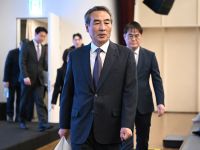.countryname:link {font-weight:bold;text-decoration:underline;}
.countryname:active {font-weight:bold;text-decoration:underline;}
.countryname:visited {font-weight:bold;text-decoration:underline;}
.countryname:hover {font-weight:bold;text-decoration:underline;color:#0066ff}
Country ratings convey the medium to long-term investment risk in all the Middle Eastern countries as well as the territories under control of the Palestinian Authority. The rating formula is comprised of both political and commercial dimensions. The political assessment, which accounts for two-thirds of the overall rating, considers each nation's internal stability and susceptibility to external political and military threats. The commercial assessment, one-third of the overall ranking, accounts for each nation's macro-economic performance and outlook, as well as government privatization efforts and other economic reforms. A rating of eight or higher conveys a very attractive investment and commercial climate. A rating of three or less suggests significant investment risk.
Iran
4.0
3.5
5.0
Strengths:
Immense oil and gas potential; increased economic reform and foreign investment; warming relations with the West (especially Europe)
Weaknesses:
Growing internal political rifts; accelerating inflation and unemployment; huge black market; increasing student frustration
Danger:
Intensified Islamic backlash to growing political reform; retreat from reforms and investment incentives
Iraq
1.8
1.5
2.5
Strengths:
Withering UN resolve; oil for food deal; no capable internal opposition; burgeoning foreign interest in local market
Weaknesses:
Dilapidated infrastructure; continued UN sanctions
Danger:
Retreat of oil for food deal; Shi’ite majority unrest; outbreak of war
Israel
6.0
5.5
7.0
Strengths:
Diverse economic base; commitment to privatization and other reforms; advanced infrastructure; booming IT sector; skilled workforce; strong relations with the West
Weaknesses:
Sluggish economic growth; deteriorating relations with Palestinians; uncertain border with Lebanon; internal societal rifts
Danger:
Palestinian rioting; complete collapse of peace talks; international alienation; outbreak of war with Palestinians
Jordan
5.0
5.5
4.0
Strengths:
Revered monarchy; positive economic reforms; close ties with West; warming regional relations
Weaknesses:
Poor economic performance; Pro-Iraqi, pro-Palestinian, anti-Israeli opposition groups; scarcity of vital natural resources; heavy debt burden; inexperienced monarch
Danger:
Rift in Royal Family; riots; war in the Gulf and cut off of oil supplies
Kuwait
5.8
5.5
6.5
Strengths:
Solid military alliance with US and UK; gigantic oil reserves; large government holdings abroad; liberalization of investment laws
Weaknesses:
Caught between US/UK-Iraqi tensions; dependence on oil revenues; growing anti-Western sentiment; domestic political rifts over economic policy
Danger:
War with Iraq; failure to diversify economy; stock exchange crash
Lebanon
3.6
4.0
3.0
Strengths:
Relatively diversified economic base; international economic commitment to reconstruct the country’s southern region
Weaknesses:
Uncertain future in the south; slowing economic growth; mounting public debt; civil strife; wide-spread public corruption
Danger:
Escalation of conflict in the south; civil war; economic collapse
Libya
4.7
5.0
4.0
Strengths:
Weaknesses:
Growing opposition; stagnant economy; lack of economic reform
Danger:
Civil war; further economic slide due to volatile oil prices
Morocco
6.0
6.0
6.0
Strengths:
Continued political reforms; considerable flow of tourism and foreign investment; commitment to privatization
Weaknesses:
Susceptibility to natural disaster and drought; relatively untested leadership of King Mohammed; poor human rights record
Danger:
Repeated drought and collapse of agricultural sector; mounting tension with Algeria Oman 5.6 6.0 5.0 Strengths:
Substantial oil and LNG reserves; expansion of infrastructure; increasing openness to foreign investors; preliminary steps toward privatization
Weaknesses:
Low employment of nationals; lack of economic diversity; dependence on foreign assistance
Danger:
Further oil price and LNG market shocks; regional war, Death of Sultan Qaboos Palestinian Authority 2.7 2.5 3.0 Strengths:
Significant donor aid and support; educated merchant class; potential Diaspora investment
Weaknesses:
Popularity of opposition movements (Hamas); economic dependence on Israel; wide-spread corruption
Danger:
Increased rioting; collapse of peace process; war with Israel; death of Arafat Qatar 6.2 6.0 6.5 Strengths:
Large LNG reserves; broadened political participation; expanding export markets
Weaknesses:
Strained inter-Arab relations; marginal non-oil sector
Danger:
Loss of LNG markets in Asia; volatile oil prices; war with Bahrain Saudi Arabia 5.6 5.5 6.0 Strengths:
Large oil reserves; strong Western alliances and military backing; liberalization of foreign investment laws
Weaknesses:
Growing internal opposition; over-dependence on oil sector; sluggish economic growth
Danger:
War with Iraq; internal terrorist attacks Syria 3.1 3.5 2.5 Strengths:
Oil reserves; centralized political control; economic and political foothold in Lebanon
Weaknesses:
Untested leadership of Bashar; stalled peace talks; insignificant economic reforms; deep recession; depleting oil reserves; inflated bureaucracy and corruption
Danger:
Attempts to overthrow Bashar; war with Israel; skirmishes on Turkish border Tunisia 6.5 6.5 6.5 Strengths:
Internal political stability; commitment to continued economic reforms; growing foreign commercial interests
Weaknesses:
Proximity to unstable countries (Libya, Algeria); unskilled labor force and high unemployment; increasing focus to questionable human rights’ record
Danger:
Arrest of opposition figures; stalling economic reform program United Arab Emirates 8.0 8.0 8.0 Strengths:
Substantial oil reserves; growing economic diversification; liberal political and business tradition; emerging regional IT hub; ability to adjust swiftly to economic challenges
Weaknesses:
Increasingly tense relations with neighboring Iran; competition from other Gulf port hubs
Danger:
War in the Gulf; oil price shocks Yemen 3.6 4.0 3.0 Strengths:
Significant oil & gas reserves; foreign investment in Aden Port; commitment to economic reforms; improving regional relations
Weaknesses:
Tribal opposition acts; government corruption; abysmal economic situation; dangerously high population growth rate Danger:Renewed civil war
The information contained within this report is updated as of early-July 2000. At this point, MENA Report can testify that in the economic domain, an important development has been the liberalization of foreign investment laws in a number of Gulf States. These markets, which are among the most lucrative in the Middle East due to their vast oil reserves, had been largely inaccessible to foreigners. In recent months, however, Kuwait, Bahrain and Saudi Arabia have passed laws granting international investors more open rights to their indigenous resources. Furthermore, the UAE’s new securities markets in Dubai and Abu Dhabi are in the process of opening trading to international investors. Elsewhere in the Middle East, however, economic developments have not been as encouraging. Lebanon’s mounting public debt has put its economy on the verge of collapse, and a liquidity shortage in Egypt has undermined years of solid commercial achievements.
In the political realm, the most significant event was the June 10 passing of Syrian President Hafez Al-Asad. Asad had ruled his country ruthlessly for 30 years, and suppressed opposition elements with an iron fist. At the same time, however, he secluded Syria from the global market, thus forcing its economy into a state of perpetual decay. The accession to power of his son, Dr. Bashar, confirmed on July 10, brings with it uncertainties as well as enticing possibilities. Syria’s standing as a regional power is certain to decline, and the young leader may even encounter domestic challenges from members of the security apparatus. On the other hand, Bashar represents a new generation of Arab leaders who embrace the Internet and globalization. Since his father’s demise, Bashar has already demonstrated his commitment to reform by proposing a new law that would permit foreign banks to operate in free trade zones. Still, Bashar is unlikely to deviate significantly from his late father’s foreign policy stance towards Israel. Moreover, regional dynamics were altered with the Israeli withdrawal from south Lebanon, following 18 years of military presence.
© 2000 Mena Report (www.menareport.com)








